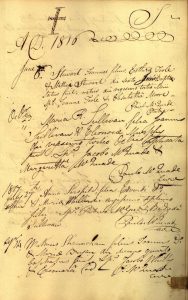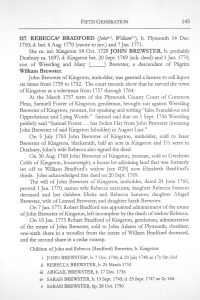 I have tried to make it a point in my blogs to give heartfelt thanks to indexing efforts of the New England Historic Genealogy Society (NEHGS) volunteers whenever we bring a new or updated collection online. Several people have asked me exactly how volunteers fit in the indexing process. Answering this question requires a little perspective on what is involved in creating one of our databases.
I have tried to make it a point in my blogs to give heartfelt thanks to indexing efforts of the New England Historic Genealogy Society (NEHGS) volunteers whenever we bring a new or updated collection online. Several people have asked me exactly how volunteers fit in the indexing process. Answering this question requires a little perspective on what is involved in creating one of our databases.
Typically, the first step is scanning images from the original source materials. The volunteers come to the library here in Boston. Then, using a flatbed scanner or 35mm camera-based book scanner, the volunteer captures every page in the book. A critical part of this phase is to take care that the images are clear and that no pages have been inadvertently skipped. This seems straightforward, but when you are processing a few hundred pages extra vigilance is required.
Once the images for a collection have been scanned, formatted, and saved in the right format, we start the actual indexing process with our dedicated group of volunteers. Each volunteer is presented with a set of images, instructions, and tips for their specific project, and an Excel spreadsheet template in which to record the data. Some indexing is done in the library, but many volunteers work from the comfort of their own homes, or wherever else might be convenient.
Finally, when the indexes have been completed and reviewed, the NEHGS web team goes through the internal publication process which brings the images and indexes together on AmericanAncestors.org.
There are two major projects in process going on now, and they will run for quite some time.
The first is the project to index the parish records for the Archdiocese of Boston. A valuable skill for this project is comfort with reading old handwritten records. Some are in Latin or other languages, as shown here in the first sample. We were very pleased to release the first eight volumes of this collection on May 18th! The total project will include over 900 volumes, so there is still quite a bit more to come.
 The second is a project focused on the Mayflower Silver Books. For this new initiative NEHGS has partnered with the General Society of Mayflower Descendants to index all the fifth-generation descendants of the Mayflower passengers. For those volunteers who might be less comfortable with handwritten documents, these are much easier to read. The second example provides a sample page for this project. The skill for this project is to accurately capture all the dates; the names of individuals, parents, and spouses; and to properly identify records of baptism, birth, marriage, death, and deed transactions in the text. This project will touch upon 31 volumes of the Silver Books and involves over 11,000 pages from those books. This work is well underway and are looking forward to releasing our first volume this summer.
The second is a project focused on the Mayflower Silver Books. For this new initiative NEHGS has partnered with the General Society of Mayflower Descendants to index all the fifth-generation descendants of the Mayflower passengers. For those volunteers who might be less comfortable with handwritten documents, these are much easier to read. The second example provides a sample page for this project. The skill for this project is to accurately capture all the dates; the names of individuals, parents, and spouses; and to properly identify records of baptism, birth, marriage, death, and deed transactions in the text. This project will touch upon 31 volumes of the Silver Books and involves over 11,000 pages from those books. This work is well underway and are looking forward to releasing our first volume this summer.
Because of our volunteers’ careful and thorough indexing efforts on these new projects, NEHGS will provide a content-rich search experience for our members that quickly helps them find relevant ancestors for their family history projects.
Just like you, I am always delighted when my searches help me discover new ancestors or new information and perspective on my ancestors. Please remember that it is our dedicated volunteers who have made these seemingly random discoveries possible for you through their not-so-random acts of genealogical kindness!
Thanks, volunteers!
What would we do without volunteers?
‘Thanks Volunteers for making these documents available to those of us who are unable to get to the Library. As a result I am able to get info on my 1600 period ancestors who were in New England.
What do you do about the known errors in these books? You can use something like Photoshop to strike through the errors, divide the page, enter the correction or adding data, date and name or initials of the person entering the correction, and entering the correction on an index page. You can GOOGLE ‘Error correction procedures’ but this is in general what various companies, industries and Mil-Spec’s use to safeguard and protect lives, equipment and reputations.
Take Care
Dave
Hi David,
Thank you for your question. Our primary approach is to provide an accurate index/abstract of the records as written – even if the author was in error. We also make a point not to edit the images – they are just a copy of the source materials. While indexing there is not an opportunity to write a justification for why we would be correcting a source – which could be very lengthy. Our goal is to be faithful to the source being transcribed.
Having said that, in cases of obvious mispellings, we will transcribe the value from the source, then add a corrected value separated by a comma. This technique is also extremely helpful with common abbreviations. As a example, if the first name is “Wm.”, we would index this as “Wm., William”. Our search technology would consider a search as a match with either value.
Best Regards
Don
Do you accept transcriptions from members and, if so, how would that work? My sister and I are transcribing one volume of the Parkhurst Manuscript that covers an ancestral family in New London, Connecticut. There’s been a lot of erroneous genealogy info circulated about some of these branches, so we’d like to help get the good info out there as a resource.
Hi Linda. Perhaps you could provide me with some additional via email or we could schedule some time to speak directly?
God Bless Volunteers! I haven’t looked lately at one of the Silver Books, is my memory off or are they indexed already? I may be thinking of other sources I have used. But do make note of pages I find some information about from any source. That might be why am thinking they are indexed:)
This will be the first time they are indexed and available online
Ah Yes, of course, having worked in a History Room in a Library for 21 years I have used these books many times, My mind just went to those and didn’t think about that the article was about online use. Must get with it more, have been retired nearly 10 yrs now:).